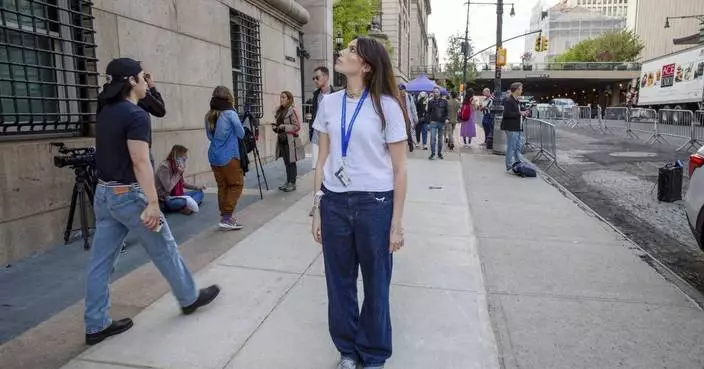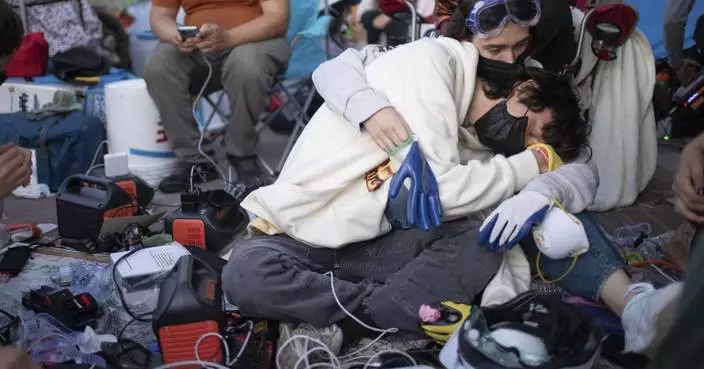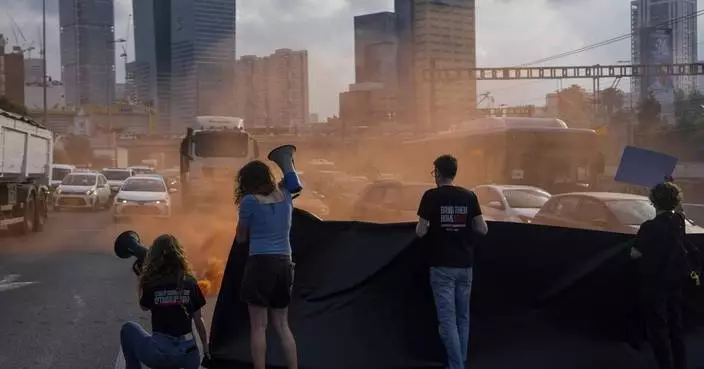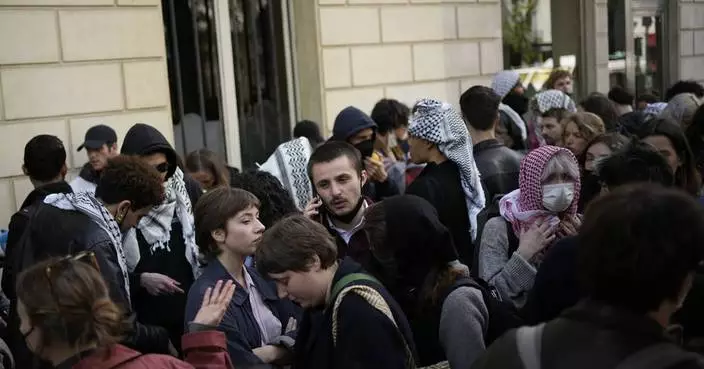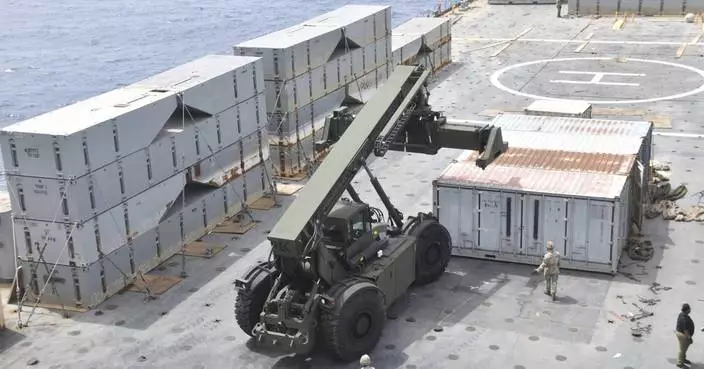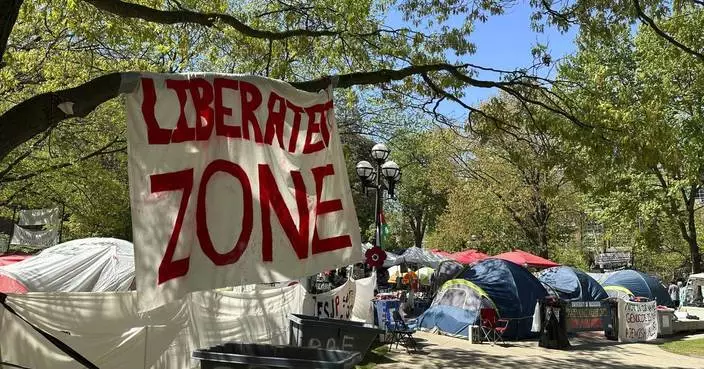Israeli airstrikes killed two Hamas members early Saturday following a rocket attack on Israel, in the latest fallout from President Donald Trump's decision to recognize Jerusalem as Israel's capital — a development that has roiled the region and the larger Muslim world.
The Israeli military said it targeted four Hamas facilities in response to rockets fired the previous night, including one that landed in the town of Sderot without causing casualties or major damage. The military said it struck warehouses and weapons manufacturing sites, after which Hamas said it had recovered the bodies of two of its men.
Click to Gallery
Israeli airstrikes killed two Hamas members early Saturday following a rocket attack on Israel, in the latest fallout from President Donald Trump's decision to recognize Jerusalem as Israel's capital — a development that has roiled the region and the larger Muslim world.
Israel considers Hamas responsible for all rocket fire emanating from Gaza, which is home to other armed groups. Some residents of Sderot and other border towns spent the night in shelters, fearful of a resumption of rocket attacks from Gaza that have led to three Israel-Hamas wars over the past decade.
In a first, violence spilled into Israel itself, with Arab protesters blocking a major highway in the northern part of the country and hurling rocks at a bus and motorcycle rider, injuring two slightly. Israel has mobilized troops in case further violence breaks out. However, the clashes in the West Bank and east Jerusalem have yet to claim lives or spiral into the level of violence some had feared following Trump's move.
Palestinian President Mahmoud Abbas' Fatah movement and other groups have called for mass protests while its rival, the Gaza-based Islamic militant group Hamas, is calling for a third violent uprising against Israel, though such appeals have largely fizzled as Palestinians have become disillusioned with their leaders.
Palestinian official Hanan Ashrawi said the council took a strong stance against "American violations of international law."
Israeli horse mounted police charges Palestinians during a protest against U.S. President Donald Trump's decision to recognize Jerusalem as the capital of Israel in Jerusalem, Saturday, Dec.9, 2017.(AP Photo/Mahmoud Illean)
Israeli police arrest a Palestinian during a protest against U.S. President Donald Trump's decision to recognize Jerusalem as the capital of Israel in Jerusalem, Saturday, Dec.9, 2017.(AP Photo/Mahmoud Illean)
Israel police arrest a Palestinian during a protest against U.S. President Donald Trump's decision to recognize Jerusalem as the capital of Israel in Jerusalem, Saturday, Dec.9, 2017.(AP Photo/Mahmoud Illean)
Israel police arrest a Palestinian during a protest against U.S. President Donald Trump's decision to recognize Jerusalem as the capital of Israel in Jerusalem, Saturday, Dec.9, 2017.(AP Photo/Mahmoud Illean)
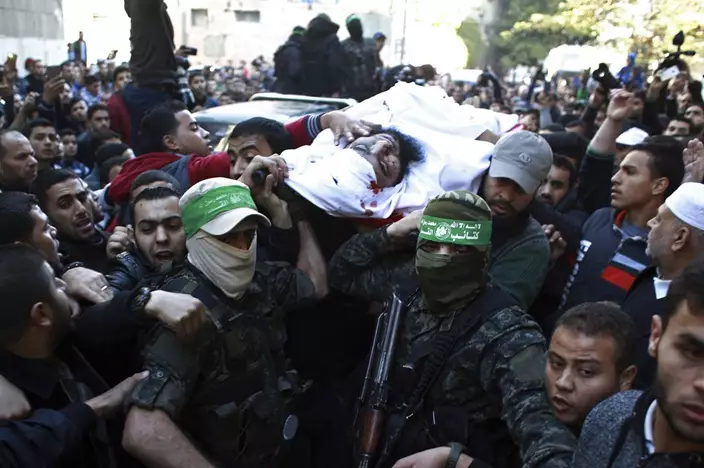
Palestinian mourners carry the body of Hamas militant Muhammed Al-Safadi, who was killed in an Israeli missile strike on a Hamas military base, during his funeral in Gaza City, Saturday, Dec. 9, 2017. (AP Photo/ Khalil Hamra)
Israel considers Hamas responsible for all rocket fire emanating from Gaza, which is home to other armed groups. Some residents of Sderot and other border towns spent the night in shelters, fearful of a resumption of rocket attacks from Gaza that have led to three Israel-Hamas wars over the past decade.
Protests and demonstrations continued across the West Bank and Gaza on Saturday on the third and final so-called Palestinian "day of rage" following Trump's announcement. The military said there were clashes in some 20 locations. In Bethlehem, Palestinians hurled stones at Israeli troops, who responded with tear gas, rubber bullets and stun grenades. The Israeli military said some 600 Palestinians were throwing firebombs and rolling burning tires toward Israeli forces. It said it dispersed the crowds and arrested six rioters.
Along the border with the Gaza Strip, some 450 Palestinians clashed with Israeli troops at eight main locations. About 20 were lightly wounded. Some 4,000 demonstrators gathered in Gaza City and demonstrations resumed in Pakistan, Turkey and elsewhere across the Muslim world as well.
In Jerusalem, police forces — some on horseback — scuffled with protesters near the Old City and arrested 13 people who were involved in what they called an illegal protest. Four policemen were slightly injured.
"President Trump cannot take what he doesn't have," said Zuheir Dana, one of the protesters from east Jerusalem.
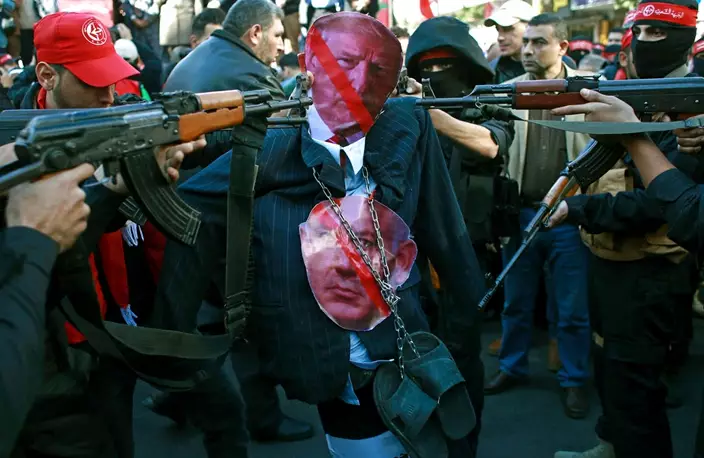
Palestinian masked gunmen of the Popular Front for the Liberation of Palestine point their guns at an effigy of US President Donald Trump, during a protest against US President Donald Trump's decision to recognize Jerusalem as Israel's capital, in Gaza City, Saturday, Dec. 9, 2017. (AP Photo/ Khalil Hamra)
In a first, violence spilled into Israel itself, with Arab protesters blocking a major highway in the northern part of the country and hurling rocks at a bus and motorcycle rider, injuring two slightly. Israel has mobilized troops in case further violence breaks out. However, the clashes in the West Bank and east Jerusalem have yet to claim lives or spiral into the level of violence some had feared following Trump's move.
Saturday saw a drop in the scope of the protests after clashes erupted Friday between Palestinian protesters and Israeli troops in dozens of West Bank hotspots and along the Gaza border. Two Palestinians were shot dead in Gaza and dozens were wounded in the West Bank. In Jerusalem, Friday prayers at Islam's third-holiest site dispersed largely without incident. Large crowds of worshippers across the Muslim world staged anti-U.S. marches Friday, some stomping on posters of Trump or burning American flags.
Trump's announcement on Jerusalem, and his intention to move the U.S. Embassy there, triggered denunciations from around the world, with even close allies suggesting he had needlessly stirred more conflict in an already volatile region. The status of the city lies at the core of the Israeli-Palestinians conflict, and Trump's move was widely perceived as siding with Israel. Even small crises over Jerusalem's status and that of the holy sites in its ancient Old City have sparked deadly bloodshed in the past.
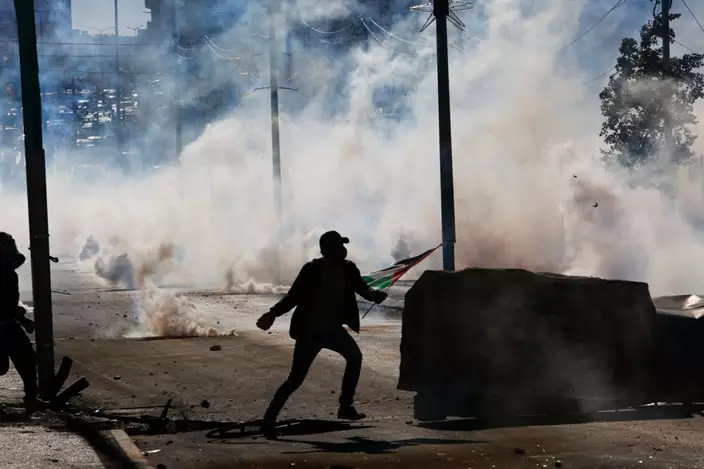
Palestinians clash with Israeli troops during a protest against U.S. President Donald Trump's decision to recognize Jerusalem as the capital of Israel in the West Bank city of Bethlehem, Saturday, Dec.9, 2017.(AP Photo/Nasser Shiyoukhi)
Palestinian President Mahmoud Abbas' Fatah movement and other groups have called for mass protests while its rival, the Gaza-based Islamic militant group Hamas, is calling for a third violent uprising against Israel, though such appeals have largely fizzled as Palestinians have become disillusioned with their leaders.
Arab foreign ministers, meanwhile, gathered in the Egyptian capital, Cairo, for an emergency meeting to formulate a unified response to Trump's decision. It was not immediately clear what concrete measures might be taken to counter Trump's decision, but Arab diplomats have spoken of submitting a draft resolution condemning the move to the U.N. Security Council and unspecified measures regarding bilateral ties between Arab League member states and Washington.
Hamas, which seeks Israel's destruction, killed hundreds of Israelis in suicide bombings and other attacks during the second Palestinian uprising in the early 2000s.
Most countries have not recognized Israel's 1967 annexation of east Jerusalem and maintain their embassies in Tel Aviv. Under a longstanding international consensus, the fate of the city is to be determined in final status peace negotiations. Israel says it hopes others will follow Trump's lead, but the United States found itself alone in the U.N. Security Council on Friday, fielding criticism from the other 14 members over the proposed move.
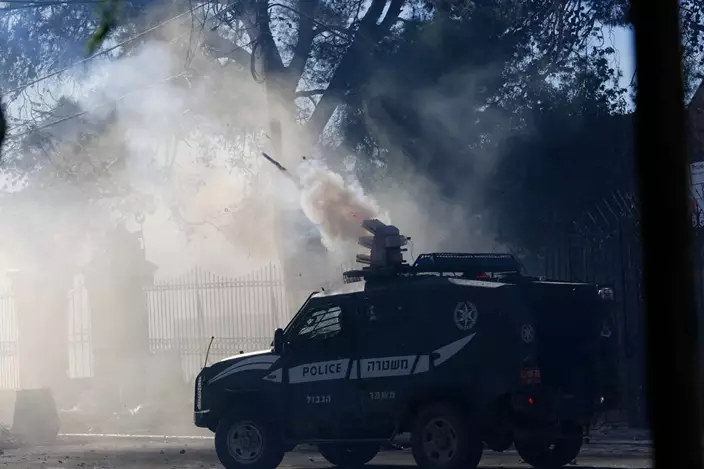
Israeli security forces shoot tears at Palestinians during a protest against U.S. President Donald Trump's decision to recognize Jerusalem as the capital of Israel in the West Bank city of Bethlehem, Saturday, Dec.9, 2017. (AP Photo/Nasser Shiyoukhi)
Palestinian official Hanan Ashrawi said the council took a strong stance against "American violations of international law."
"They have no mandate to give away Jerusalem to an occupying power or to violate international law in such a blatant and egregious manner," she said.
While Trump's announcement was warmly welcomed in Israel as an acknowledgement of its longtime seat of government and the ancient capital of the Jewish people, it was greeted with outrage from Palestinians who considered it a slap in the face and an abandonment of the longtime American role as mediator in the conflict.
After two decades of halting peace negotiations that have failed to bring Palestinians closer to statehood, some in Abbas' inner circle have begun to speak openly about abandoning the two-state formula in favor of a single binational state. In a sign of Palestinian frustration with the Americans, Abbas' political adviser Majdi Khaldi said the Palestinian president will not meet with Vice President Mike Pence when he visits the region later this month.
"The U.S. crossed the red line in its decision about Jerusalem," he told The Associated Press.
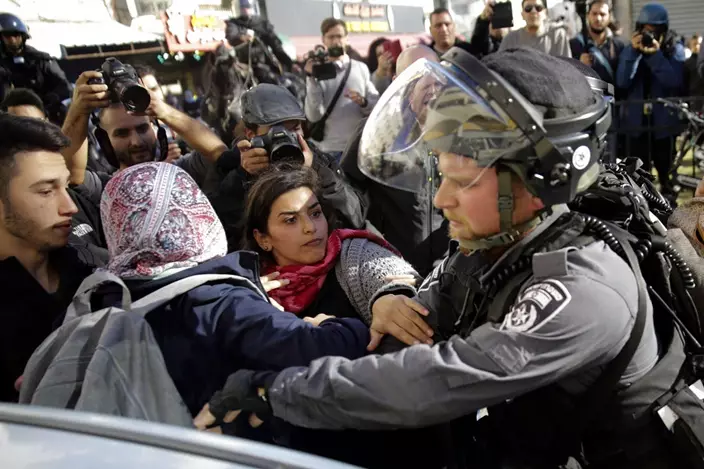
Israeli policeman scuffles with Palestinian women during a protest against U.S. President Donald Trump's decision to recognize Jerusalem as the capital of Israel in Jerusalem, Saturday, Dec.9, 2017.(AP Photo/Mahmoud Illean)
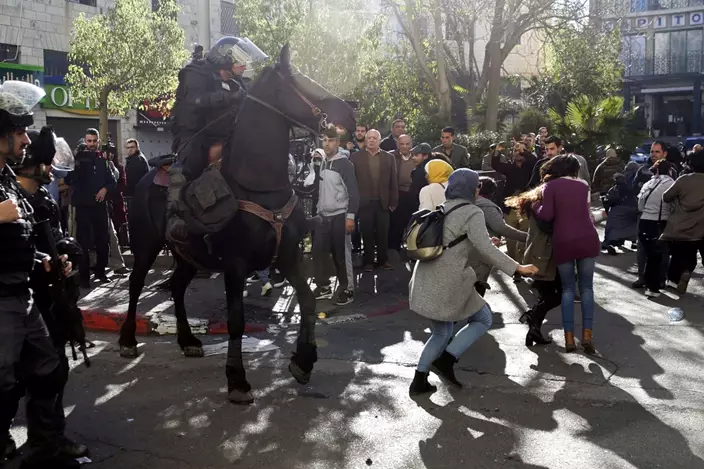
Israeli horse mounted police charges Palestinians during a protest against U.S. President Donald Trump's decision to recognize Jerusalem as the capital of Israel in Jerusalem, Saturday, Dec.9, 2017.(AP Photo/Mahmoud Illean)
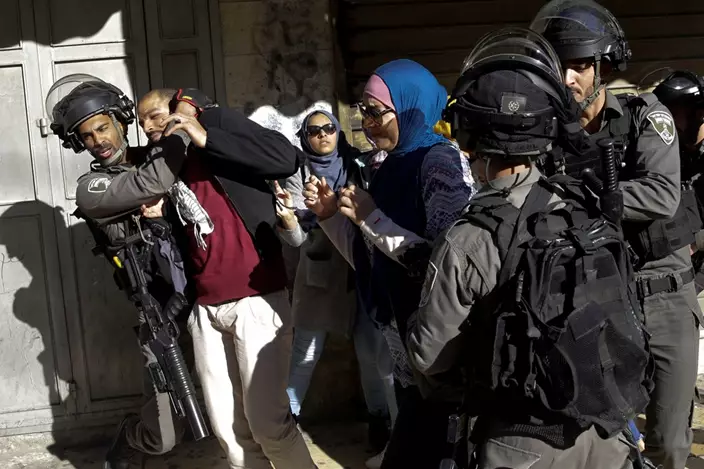
Israeli police arrest a Palestinian during a protest against U.S. President Donald Trump's decision to recognize Jerusalem as the capital of Israel in Jerusalem, Saturday, Dec.9, 2017.(AP Photo/Mahmoud Illean)
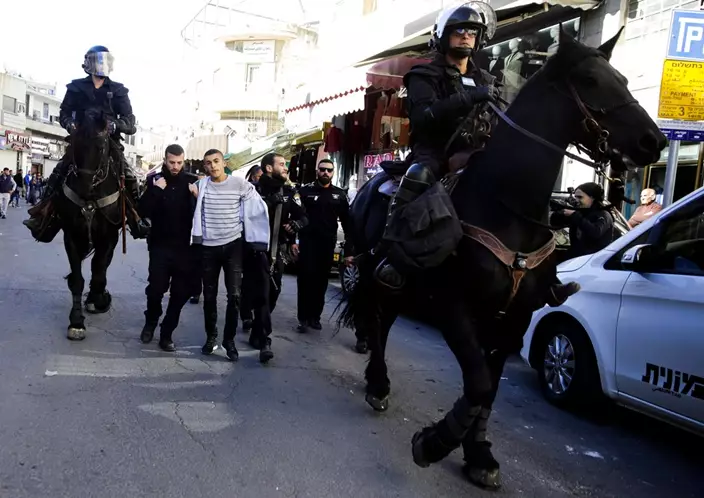
Israel police arrest a Palestinian during a protest against U.S. President Donald Trump's decision to recognize Jerusalem as the capital of Israel in Jerusalem, Saturday, Dec.9, 2017.(AP Photo/Mahmoud Illean)
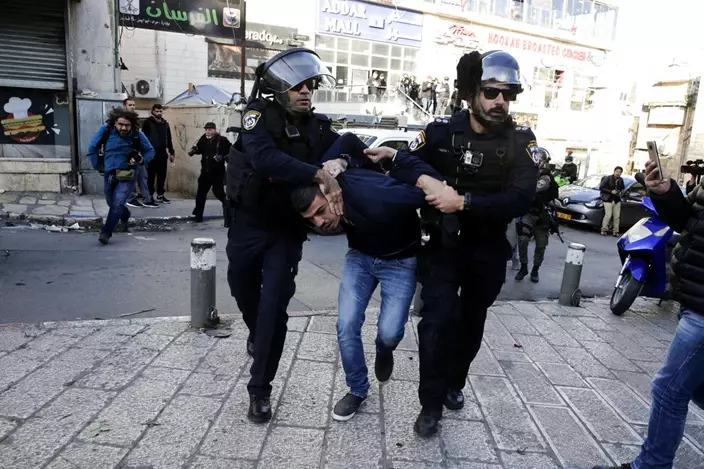
Israel police arrest a Palestinian during a protest against U.S. President Donald Trump's decision to recognize Jerusalem as the capital of Israel in Jerusalem, Saturday, Dec.9, 2017.(AP Photo/Mahmoud Illean)
Some Jewish students have taken part in strident pro-Palestinian protests dominating U.S. colleges in recent weeks, but few have led rallies in support of Israel or against perceived displays of antisemitism.
That may be starting to change.
Like many Americans, Jewish students’ views on the Israeli-Palestinian conflict are wide-ranging and often nuanced. It wasn’t for a lack of concern about the war in Gaza or the backlash it has aroused on their campuses that some shied away from demonstrating.
They have had fervent debates with each other over whether and how to respond as pro-Palestinian encampments spread from one university to the next.
Some joined the encampments, celebrating Passover among the tents with fellow protesters. Many felt unnerved by what they considered to be anti-Israel rhetoric and said they feared rallying.
Now, groups in solidarity with Jewish students plan dozens of rallies in the coming days. Protesters hoisted Israeli flags at Indiana University Bloomington and near George Washington University on Thursday, and more flew outside MIT on Friday.
Their goals include standing in solidarity with Jewish students and showing there’s room for empathy for both Palestinians and Israelis affected by the war.
At George Washington University in Washington, D.C., about 150 people — including many Jewish students — gathered Thursday in a grassy courtyard. The goal, said organizer Gabrielle Guigui, “was to show Jewish pride and Jewish unity ... and to get Jewish students together, because a lot of them are scared.”
Senior Brina Cartagenova clutched a necklace with her Hebrew name on it, the same necklace she'd previously taken off over fear of retaliation on campus.
“I was scared to put this back on for, like, at least three weeks, and then I finally did the other day,” she said. “This type of event definitely helps me feel more comfortable.”
The pro-Palestinian encampments around the country have been largely peaceful, though there have been some clashes. Administrators and campus police at UCLA faced intense criticism Wednesday for failing to act quickly to stop an attack on a pro-Palestinian encampment on campus by counter demonstrators who threw traffic cones and chairs, released pepper spray and tore down barriers.
Some pro-Palestinian demonstrators fought back, and skirmishes continued for hours before outside law enforcement agencies were called to intervene.
The campus tensions are complicated by the deep history and emotions wrapped up in the Israel-Hamas war. It began on Oct. 7 when Hamas militants attacked Israel and killed roughly 1,200 people, mostly civilians, and took another 250 hostage — the deadliest attack against Jews since the Holocaust.
Vowing to stamp out Hamas, Israel has waged a brutal campaign against the militant group that rules Gaza in a conflict that has killed more than 34,000 Palestinians along the way, according to the Health Ministry there.
Protests in support of Israel or the Palestinians have bubbled up across the U.S. ever since Oct. 7. But the major wave of pro-Palestinian rallies on campuses kicked off two weeks ago, after more than 100 protesters were arrested at Columbia University in New York. They have demanded that colleges stop doing business with Israel and with companies tied to it.
Jewish Americans between the ages of 18 and 34 are closely divided on whether Israel’s post-Oct. 7 military campaign has been acceptable, according to a Pew Research Center poll conducted in February.
But instances of hatred among the antiwar protests have rattled many Jewish students, regardless of how they feel about Israel's government or its treatment of Palestinians.
Some examples from campus protests that stung: A poster depicting the Star of David crossed out in red. “Death to Israel” scrawled in spray paint. Chants of “We are Hamas.”
“Not everyone is actively endorsing these antisemitic posters and chants and signs and graffiti, but it feels like a large majority is at least OK with it — OK enough to to ignore it and to let Jewish students continue feeling unwelcome,” said Lily Cohen, 21, a Jewish student at Northwestern University.
"It felt very daunting to counterprotest," she said.
Inside the Northwestern encampment was another Jewish student, junior Paz Baum.
Baum, who held a Passover seder among the tents with the other pro-Palestinian protesters, said her religious values compelled her to protest over the war in Gaza.
“I see a direct parallel between the experiences of my Jewish ancestors and the experience of the tens of thousands of Palestinians being slaughtered,” said Baum, whose great-grandparents fled pogroms in eastern Europe.
Baum insisted that hateful posters were taken down as they were spotted, and said the only antisemitism she had witnessed was from several Jewish protesters, mostly older adults, who confronted the encampment on Sunday.
As Baum held a sign reading “Jews for a cease-fire,” she said they lobbed antisemitic slurs at her. Other pro-Palestinian protesters have said accusations of antisemitism are bandied about merely to discredit their movement.
The encampment at Northwestern reached an agreement with the university on Monday and cleared out.
At Columbia, some pro-Palestinian protesters have condemned hateful rhetoric coming from their ranks, including remarks from a student who said “Zionists don’t deserve to live” in a recently surfaced video. That student, who acted as a spokesperson for the encampment and has since walked back his statements, has been banned from campus. But the incident, along with others, struck a nerve.
“It is completely OK to protest the war in Gaza or be horrified by various actions of the Israeli government,” said Jacob Schmeltz, a student at Columbia, but “Jewish students at Columbia right now do not feel physically or emotionally safe to be on campus.”
Schmeltz, who is one of the leaders of the national Jewish on Campus Student Union, said the group has strategized on how to respond as protests multiplied.
They used social media to highlight what they saw as antisemitism on campus, but a protest wasn't really on the table.
“How is it possible to organize a counter protest when many of us are at home or just trying to stay in their dorm rooms because they’re afraid of what will happen if they go onto campus?” said Schmeltz.
Organizations including Hillel and the Israeli-American Council have planned more rallies in the coming days to show Jewish and pro-Israel students and faculty "that they are not alone,” said Elan Carr, CEO of the organization.
Adam Lehman, president of Hillel International, said the rallies will affirm that Jewish students are resilient, deserve respect and can “show empathy to the plight of Palestinians while also simultaneously showing empathy for Israelis.”
At the University of North Carolina Chapel Hill, pro-Israel Jewish students have for weeks tossed around different ideas. A few argued to ignore the pro-Palestinian encampment on campus, to show that “you can do that, but you’re not affecting us,” said Jewish student Eliana Halivni. A few waved Israeli flags.
Some scrawled the Star of David in chalk, said Halivni, “so that they know that we’re here, even if they can’t physically see us.”
This article has been updated to correct the name of the Israeli-American Council.
Associated Press reporters Darren Sands in Washington, Isabella Volmert in Bloomington, Indiana, and Kavish Harjai in Los Angeles, contributed to this report.

Indiana University freshman Mykala Kaplan speaks about her recent experiences being Jewish on campus during a pro-Israel rally at Indiana University in Bloomington, Ind., Thursday, May 2, 2024. (AP Photo/AJ Mast)

Protesters listen during a pro-Israel rally at Indiana University in Bloomington, Ind., Thursday, May 2, 2024. (AP Photo/AJ Mast)

FILE - Demonstrators clash at an encampment at UCLA early Wednesday, May 1, 2024, in Los Angeles. Dueling groups of protesters have clashed at the University of California, Los Angeles, grappling in fistfights and shoving, kicking and using sticks to beat one another. (AP Photo/Ethan Swope, File)

FILE - Israeli supporters demonstrate at George Washington University where pro-Palestinian students protest over the Israel-Hamas war, Thursday, May 2, 2024, in Washington. (AP Photo/Jose Luis Magana, File)

FILE - A group of pro-Israel supporters hold arms as they sing and dance outside a pro-Palestinian encampment on the UCLA campus Friday, April 26, 2024, in Los Angeles. (AP Photo/Damian Dovarganes)

Rabbi Levi Cunin, with Chabad on Campus, speaks during a pro-Israel rally at Indiana University in Bloomington, Ind., Thursday, May 2, 2024. (AP Photo/AJ Mast)

Protestors make signs before a pro-Israel rally at Indiana University in Bloomington, Ind., Thursday, May 2, 2024. (AP Photo/AJ Mast)

Protesters listen during a pro-Israel rally at Indiana University in Bloomington, Ind., Thursday, May 2, 2024. (AP Photo/AJ Mast)

Rabbi Levi Cunin, with Chabad on Campus, speaks during a pro-Israel rally at Indiana University in Bloomington, Ind., Thursday, May 2, 2024. (AP Photo/AJ Mast)





















